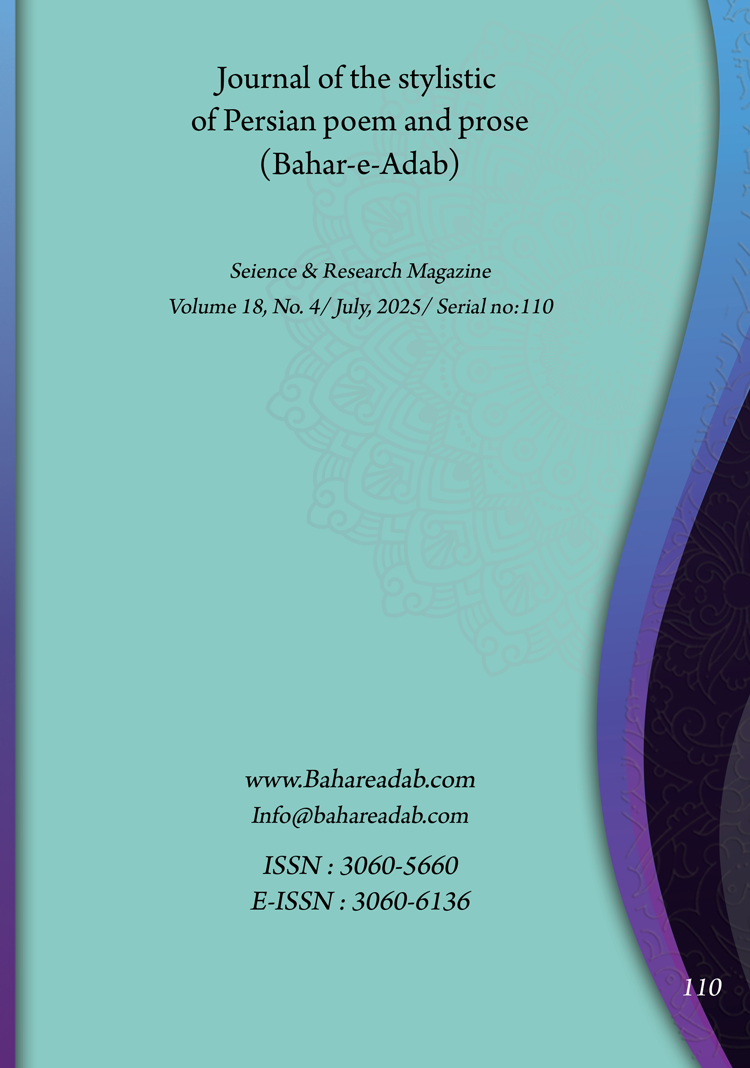- Count View : 271
- آدرس کوتاه شده مقاله: https://bahareadab.com/article_id/1837
Journal of the stylistic of Persian poem and prose
volume Number 18،
number In Volume 4،
،
issue Number 110
Analysis and Study of the Components of a Good Life in Saadi's Bustan Based on Martin Seligman's Theory
Naimeh Omdeh Ghiyasi , Kamran Pashaei Fakhri (Author in Charge), Parvaneh Adelzadeh
Abstract
BACKGROUND AND OBJECTIVES: This research aims to analyze and study the components of a desirable and good life from the perspective of Martin Seligman"s positive psychology, focusing on Saadi"s attention to these components in the form of moral virtues and capabilities in the Bustan.
METHODOLOGY: The present research method is descriptive-analytical based on the critique of modern psychology and the use of Martin Seligman"s opinions and theories regarding a good and positive life. The statistical population is Saadi"s Bustan, corrected by Gholamhossein Yousefi. The research is conducted in three stages as follows: first, identifying Seligman"s points of view regarding a good life, second, identifying Saadi"s views in the Bustan regarding a good life, and third, comparing Saadi"s and Seligman"s views.
FINDINGS: The research findings indicate that the components of positive psychology that Martin Seligman proposes in order to improve the quantity and quality of people"s lives and create favorable conditions in human interactions have been considered in a completely deep and precise manner in Saadi"s Bustan centuries before the scientific presentation of this theory in modern psychology. Saadi, taking a close look at these propositions, composed the Bustan based on attention to moral virtues, which shows his attention to the depth of human spiritual and psychological issues.
CONCLUSION: The research results show that justice, knowledge and wisdom, attention to humanity, gratitude, self-control, moderation in affairs, courage, prudence, responsibility and excellence are among the propositions and components that have been considered in Saadi"s Bustan in line with Seligman"s components of positive psychology in order to enjoy a good life.
Keyword
Positive psychology. Martin Seligman. Good life. Saadi Busta
- Asadollahi. Khodabakhsh and Barzegar Maher. Zeinab (2024). A study of positive thinking in Mantiq al-Tayr Attar with emphasis on Martin Seligman's model. Scientific Journal of Persian Poetry and Prose Stylistics (Bahar Adab Saheb). Year 17. Issue 4. Serial 98. pp. 47-66.
- Carr. Allen (2006). Positive Psychology: The Science of Happiness and Human Strengths. Translation: Hassan Pasha Sharifi et al. Tehran: Sokhan, pp. 53-288.
- Dosti. Zahra et al. (2022). Virtues in contemporary and Egyptian fiction based on Seligman's views. Literary criticism and stylistic research, year 13. Issue 4. Serial 50. pp. 31-52.
- Frankl. Victor (2019). Man in Search of Meaning. Translated by: Morteza Hassanvand. Third edition. Tehran: Ahu.
- Ghorbani. Um al-Banin et al. (2023). A study of positive thinking components in Saeb Tabrizi's sonnets based on Martin Seligman's positivist theory. Scientific Journal of Persian Poetry and Prose Stylistics. Volume 16. Serial Number 88. pp. 119-143.
- Hosseini Motlagh. Mehdi (2015). Characteristics of a desirable life in positive psychology and its comparison with a desirable life in Islamic sources with emphasis on the era of the advent of Imam Zaman (a.s). Master's thesis. Qom: Institute of Ethics and Education, p. 68.
- Mohseni. Morteza et al. (2011). Analysis of Qabusnameh from the Perspective of Positive Psychology. Journal of Persian Literature Prose Studies. Faculty of Literature and Humanities. Shahid Bahonar University of Kerman. Year 24. New Volume. Issue 41. pp. 186-210.
- Rafiei Honar. Hamid (2018). Fundamentals of Islamic Happiness-Oriented Counseling and Psychotherapy (with a View to Positive Psychology). Qom: Quran and Hadith Research Institute, pp. 73
- Saadi. Mushraf al-Din Mosleh bin Abdullah (2005). Saadi's Bustan. Edited by: Gholamhossein Yousefi. Tehran: Kharazmi.
- Schultz. Duane. P. and Schulz. Sidney Allen (1403). Theories of Personality. Translated by: Yahya Seyed Mohammadi. Fifty-second edition. Tehran: Editorial, p. 501.
- Seligman. Martin (2012). Psychopathology. Translated by: Reza Rostami et al. Volume 1. Tehran: Arjomand, p. 78.
- ______________ (2013). Learned Optimism. Translated by: Ramin Karimi and Elham Lasadat Afraz. Fifth Edition. Tehran: Bahar Sabz, p. 192.
- ______________ (2015). Inner Happiness. (Positive Psychology in the Service of Sustainable Satisfaction). Translated by: Mostafa Tabrizi et al. Tehran: Danjeh, pp. 10-12-8, 125-323-67-188-298.
- ______________ (2015). The Flourishing of Positive Psychology. Translated by: Amir Kamkar and Sakineh Hejabarian. Tehran: Rawan, pp. 12-17.
- ______________ (2019). From Happiness to Growth. Translated by: Zohreh Ghorbani. Tehran: Sayeh Sokhan Publishing House, pp. 164-191.
- Goleman. Daniel (2021). Leadership: The Power of emotional in telligence: more Than sound LLC.
- Lam. Laura. Tand kirby. Susan.L (2002). Is emotional an advantage: An exploration of the impact of emotional and general intelligence on individual Performance: the Journal of social psycholgy .142 (1)
- Psychologist Republis with Permission American From the Psycologist.p 55.
- Seligman-m and et .all (2000) Positivive Psychology-an introduction American

